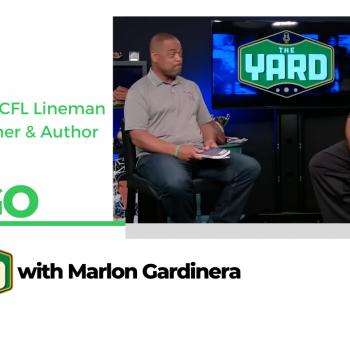
Meet Blind Bartimaeus, a man who seems at first blush to be nothing more than a bit player in this most dramatic and poignant moment.
As you will hear in this PODCAST, this wasn’t the first time that Jesus healed a blind man. Nor is this the first time we have talked about Jesus healing a blind man. Last November, Podcast 141, comes to mind. So I would totally understand if you were tempted to bring to this story a sense of “been there, done that,” Déjà vu all over again. Like, if you’ve seen one blind-man-healing, you’ve seen them all, right? WRONG!
As I said just a moment ago, this story is both dramatic and poignant.
The implications of this story, both for the Jews of Jesus’ day, and for the entire world in our day, cannot be overstated. This story is indeed dramatic, dramatic in the extreme.
Nor can we overstate the emotional state Jesus must have been in at this most significant moment of His ministry, as the final chapter of His life is about to unfold. Emotions that infuse this story with feeling from start to finish. A story poignant to a palpable degree.
To be perfectly honest, there is so much going on here that I’m really in a quandary as to where to start. So let me start with this: In the Middle East, both in Jesus’ day, and in our own day, Symbolism = Substance.
Symbolism = Substance. IOW, as I’ve said so often, the Bible is God’s picture book. The biblical writers were painters. The visual means something. Symbolism = Substance.
In this story about yes, yet another blind man being healed by Jesus, it really is all about the optics. The symbolism. The connections that the original readers would have made in their minds as they read Matthew, Mark, and Luke’s account of this miracle
The symbolism of What happened (the healing of Blind Bartimaeus), When it happened (c. AD 30, just days before Jesus’ Triumphal Entry into Jerusalem), and Where happened (Jericho).
Let’s begin by reading a couple passages that may seem disjointed at first, but will come together soon enough:
47 When Bartimaeus heard that Jesus of Nazareth was nearby, he began to shout, “Jesus, Son of David, have mercy on me!” (Mark 10:47)
51 “What do you want me to do for you?” Jesus asked.
“My Rabbi,” the blind man said, “I want to see!” (Mark 10:51)
Now, while this story is not recorded in John’s Gospel account, he did write this at the end of his book, in regards to Jesus’ miracles:
Jesus did many other things as well. If every one of them were written down, I suppose that even the whole world would not have room for the books that would be written. (John 21:25)
Knowing this, the Biblical writers had to be selective in which miracles they recorded. This is why it is so remarkable that, as they wrote independent of one another, Matthew, Mark, and Luke all chose to include the healing of Bartimaeus, without copying from one another! Each writer included and excluded certain details of the story, yet the message of the miracle, and the context of the miracle is the same… including the fact that this is the final miracle before Jesus’ Triumphal Entry into Jerusalem that each of them record.
Why?
You see, when He healed Bartimaeus, Jesus was seemingly trying with all His might to prevent His own prophesy about His beloved Holy City from being fulfilled.
What?
Believe me, Jesus wanted nothing more than for His prophesy to not be fulfilled. Which prophesy? The one regarding Jerusalem’s fate that Luke detailed in Luke 19:41:44,
41 But as he came closer to Jerusalem and saw the city ahead, he began to weep.42 “How I wish today that you of all people would understand the way to peace. But now it is too late, and peace is hidden from your eyes. 43 Before long your enemies will build ramparts against your walls and encircle you and close in on you from every side. 44 They will crush you into the ground, and your children with you. Your enemies will not leave a single stone in place, because you did not recognize it when God visited you.”
You see, by healing Bartimaeus, Jesus was pleading with the Jews of His day to open their own eyes and see the light… His light… before it was too late.
Symbolism = Substance.
Rabbi Ken Spiro recorded Jerusalem’s fate in this way:
Titus attacks just after Passover in the year 70 CE, battering the city with his catapults which propel a rain of stone, iron and fire onto the population…
A horrific slaughter ensues with the Romans taking the city, literally house-by-house…
Despite the determined resistance of the Jewish defenders Titus slowly works his way to the Temple Mount. Now a duel to the death ensues, and finally, five months after the Romans had begun this attack Titus orders the Second Temple razed to the ground…
All of the neighboring countryside is denuded of whatever trees remained from the siege to create the giant bonfire to burn the buildings of the Temple to the ground. The intense heat from the fire causes the moisture in the limestone to expand and it explodes like popcorn, producing a chain reaction of destruction. In a day’s time, the magnificent Temple is nothing but rubble.
It’s worth noting that when Rome burned down Jerusalem, just as Jesus had predicted 40 years earlier, more people died from shrapnel than they did the flames themselves when the Temple literally exploded.
Rabbi Spiro then goes on to quote the great Jewish historian Josephus, who was actually there at the time:
While the holy house (The Temple) was on fire, everything was plundered that came to hand, and ten thousand of those that were caught were slain; nor was there a commiseration of any age…but children and old men…and priests, were all slain in the same manner… The flame was also carried a long way, and made an echo, together with the groans of those who were slain… one would have thought the whole city would have been on fire. Nor can one imagine anything greater and more terrible than this noise.
In his History Crash Course, Rabbi Spiro continued in his own words:
The destruction of the Second Temple is one of the most important events in the history of the Jewish people, and certainly one of the most depressing.
It is a sign that God has withdrawn from (though certainly not abandoned) the Jews. Although the Jews will survive ― in accordance with the promise that they will be an “eternal nation” ― the special relationship with God they enjoyed while the Temple stood is gone…
Before setting fire to the Temple, the Romans removed anything of value. Then they harnessed a group of Jewish slaves to take these priceless artifacts to Rome. Their arrival in Rome is memorialized in engravings of the Arch of Titus, still standing there today near the Forum which depicts the Triumph or victory parade held by victorious legions to celebrate their victory and display the spoils of war…
It was a horrible disaster. Hundreds of thousands of people died, many more were enslaved. There were so many Jews flooding the slave market after the Great Revolt that you could buy a Jewish slave for less than the price of a horse. Israel was in despair…
Congratulating themselves on asserting the Roman might against the defiant Jews, the Romans also minted coins depicting a weeping woman and proclaiming Judea Capta, “Judea Captured.”
Judea – the region which was home to Jerusalem. Jerusalem, which was home to the Temple. The Holy Temple, where the Almighty God resided.
So, thirty years before it’s destruction, in the same days that Jesus healed blind Bartimaeus, Jesus wept also.
So, the point to Matthew, Mark, and Luke writing about Jesus healing Bartimaeus was this: All the death, pain, destruction, slavery, and torture that the Jews suffered at the hands of Rome could have been avoided. AND WOULD HAVE BEEN AVOIDED. If only the Nation of Israel had listened to the son of one of its honorable citizens – blind Bartimaeus.
Which brings us to the question of where.
We read in Matthew 20:29-31
29 Now as they went out of Jericho, a great multitude followed Him. 30 And behold, two blind men sitting by the road, when they heard that Jesus was passing by, cried out, saying, “Have mercy on us, O Lord, Son of David!”
31 Then the multitude warned them that they should be quiet; but they cried out all the more, saying, “Have mercy on us, O Lord, Son of David!”
How incredibly fitting that this – Jesus’ final recorded miracle – took place in Jericho… the same region that Titus would later use to stage his troops before seizing Jerusalem.
Jericho is also the first place that Joshua (whose name means “God saves”) conquered as he led Israel to the Promised Land.
So, when Jesus left Jericho, healed blind Bartimaeus, and made His way to Jerusalem, there was very little room left for any other symbolic messaging that Jerusalem would fall in a mere 40 years. Then from 70AD through 1948, all humanity would be witness to the Jews fate… a fate that never had to happen.
If only they would have opened their eyes.
Now, as we examine the three different Gospel accounts of this miracle, we see a few “contradictions”.
For example, Matthew writes that there were two blind men who stopped Jesus and asked for healing. Mark and Luke, however, chose to focus on the one man who was the more outspoken of the two, and who was the son of a well-known citizen in Jericho – Bartimaeus. Therefore, this is not a contradiction, but a stylistic choice, since Bartimaeus and his family would have been more well-known to Mark and Luke’s intended readers.
Then, in Matthew’s account, it very clearly says, “As they went out of Jericho…” Yet Luke writes that the miracle happened as Jesus approached Jericho. For centuries, Bible critics have mocked the Scriptures for being historically inaccurate because of “contradictions” such as this. But the fact of the matter is this: Jesus had been on the eastern side of the Jordan River. He crossed the river at Jericho. Then, as anyone would travel toward Jerusalem from that point, Jesus passed through Old Testament Jericho – where the walls tumbled down as Joshua marched and obeyed God. Then, about a mile-and-a-half southwest from there, the road goes through New Testament Jericho that came into its own thanks to Herod the Great who built a winter palace there. So, the fact is, at the time of Jesus, there were two Jerichos: Old Testament Jericho and New Testament Jericho… and they are both still there today! And, quite literally, as you travel on that road, you leave one as you enter the other.
So, where did this miracle take place? Somewhere in the middle of this mile-and-a-half stretch of road as Jesus left Old Testament Jericho and entered New Testament Jericho. This uncompromisingly follows the actual lay of the land, as well as it proves that the Gospel writers did not copy one another.
So, who was Bartimaeus?
As Jesus and his disciples, together with a large crowd, were leaving the city, a blind man, Bartimaeus (which means “son of Timaeus”), was sitting by the roadside begging. (Mark 10:46)
We also read about this blind beggar in Luke 18:36-38)
36 When he heard the crowd going by, he asked what was happening. 37 They told him, “Jesus of Nazareth is passing by.”
38 He called out, “Jesus, Son of David, have mercy on me!”
Now, “Jesus of Nazareth” is how nearly everyone in Jesus’ day referred to Him. But that is NOT what Bartimaeus cried out to Him. Not just once, but twice, Bartimaeus cried out for everyone to hear, “Jesus, Son of David!”
39 Those who led the way rebuked him and told him to be quiet, but he shouted all the more, “Son of David, have mercy on me!” (Luke 18:39)
“Son of David”. Blind Bartimaeus could not have invoked a more revealing title for Jesus than that! These are not randomly strung together words. Think about the very first verse of the New Testament:
This is the genealogy of Jesus the Messiah the son of David, the son of Abraham (Matthew 1:1)
“Son of David” appears in the Gospels 17 different times. This is a formal title that has its origins all the way back in 2 Samuel 7:8-16, as God laid out His covenant with King David:
‘This is what the Lord of Heaven’s Armies has declared: I took you from tending sheep in the pasture and selected you to be the leader of my people Israel. 9 I have been with you wherever you have gone, and I have destroyed all your enemies before your eyes. Now I will make your name as famous as anyone who has ever lived on the earth! 10 And I will provide a homeland for my people Israel, planting them in a secure place where they will never be disturbed. Evil nations won’t oppress them as they’ve done in the past, 11 starting from the time I appointed judges to rule my people Israel. And I will give you rest from all your enemies.
“‘Furthermore, the Lord declares that he will make a house for you—a dynasty of kings! 12 For when you die and are buried with your ancestors, I will raise up one of your descendants, your own offspring, and I will make his kingdom strong. 13 He is the one who will build a house—a temple—for my name. And I will secure his royal throne forever. 14 I will be his father, and he will be my son. If he sins, I will correct and discipline him with the rod, like any father would do.15 But my favor will not be taken from him as I took it from Saul, whom I removed from your sight. 16 Your house and your kingdom will continue before me for all time, and your throne will be secure forever.’”
That’s the promise. Who will sit on that eternal throne forever? The Son of David… aka Jesus.

Why, oh why couldn’t the people of Israel see what blind Bartimaeus saw? Why couldn’t they get their heads around the fact that Jesus was indeed, the Son of David, and that the ultimate fulfillment of the Davidic Covenant was within their grasp?
If only the people of Israel had prayed the same prayer as Bartimaeus… the history of the world would have been radically different
49 When Jesus heard him, he stopped and said, “Tell him to come here.”
So they called the blind man. “Cheer up,” they said. “Come on, he’s calling you!”50 Bartimaeus threw aside his coat, jumped up, and came to Jesus.
51 “What do you want me to do for you?” Jesus asked.
“My Rabbi,” the blind man said, “I want to see!” (Mark 10:49-51)
Oh, but Israel wouldn’t pray that prayer. As Jesus put it in Matthew 13,
“…though seeing, they do not see…” (Matthew 13:13)
It makes me wonder who is really blind in this story: Bartimaeus, or the people of Israel?
And this makes it clear why this story was not among the many in John’s Gospel. You see, John wrote his account long after the 70AD fall of Jerusalem… there simply was no one left to warn of what Bartimaeus could clearly see and the people of Israel, and too many people today, are blind to.













